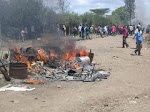"Integral" would like to take today's opportunity to sincerely apologize to its readers. In its intro, "Integral" notified the readers that it was to be published on Mondays, Wednesdays and Fridays on this page. This appeared not to have been the case. The inconsistency witnessed should not be attributed to Khartoum Monitor's (KM's) editorial. "Integral" is to blame. KM's editorial chooses the pages for its columns. It chose this page for "Integral". This page happens to be one of those pages that accommodate KM's coloured adverts. Nonetheless, readers should note that "Integral" will still be published three times a week but depending on KM's editorial decision to choose the dates within the week. Sorry for any inconveniencies caused.
In our first and previous features, "Integral" mentioned – amongst other common causes of disunity in South Sudan – tribalism, nepotism, land grabbing and occupation, greed for government power, tendency to promote lawlessness by deliberately ignoring to establish law and order and lack of interest in embracing democratic principles. In the previous feature, "Integral" discussed the first cause of disunity: tribalism. It promised to look at the other causes one by one. Today's feature will be looking at the second cause of disunity: nepotism, in South Sudan.
Nepotism means favouritism in business shown only to relatives and friends (Collins, 2000:409). Unlike tribalism, nepotism is the worst type of corruption. In addition to favouring relatives and friends, nepotism encourages sexual abuse and harassment of women and girls in larger work places like government ministries, governmental and non-governmental institutions. It has been reported that in some government ministries in the South ministers, undersecretaries and directors would not recommend employment and promotions of ladies unless they seek relationships – however short – with them to qualify.
This practice was said to have existed in South Sudan in the 70s and 80s of the last century. Senior officials in the then ministry of public service and administrative reforms made it a promise to employ after sexually harassing or literally having short relationships with girls and women who were seeking employment and deserved promotions like other members of the community with equal rights and opportunities.
Could anyone imagine the pain our dissent girls or married women – some probably widowed by the war – are going through? Could any ordinary citizen in South Sudan, with no relatives and friends in the government ministries and governmental institutions get a job, if nepotism by and large is the way to get a job? Aren't the above gross violations of girls' and women's basic human rights? Whom have we emancipated?
Let us assume that the GoSS has 100 ministers, including other constitutional post holders with ministerial portfolios in commissions and other government institutions like parliament and the army, how many would they employ from friends and relatives? Say each one of these officials would employ a hundred friends and relatives each – that would be 10,000 people – sometimes qualified relatives and friends but certainly not the best as would a board of selection choose. The 10,000 will continue to promote nepotism since it was nepotism which qualified them for employment in the first place. What would the leadership in the South be doing to the South? That would be widening the gap of division let alone the inflation of nepotism and the lowering down of the nationalism values?
Nepotism, however, is practiced by all communities in South Sudan – it is only the degree and frequency of practice that may differ. But by all standards, there are those who might have – at least by now – noticed that nepotism is bad. This is because has not seen any better performances from the employed relatives and/or friends. This situation has brought to surface two major reactions emanating from South Sudanese people: one, general discontent for the practice of nepotism; and two, the failure of the government or governmental institutions concerned to develop into better government or government institutions that deliver services to the people.
Both, the general discontent and government or governmental institutions' inability to deliver services to its people equally, sows the seeds of discord and that is disunity within a community that is supposed to be integrated. How could South Sudan possibly integrate when its people are divided along nepotistic lines – unable to become an essential part of a whole? The answer is that integration is illusive unless South Sudanese, irrespective of their party, tribal and religious affiliations work to accept each other.
Thus GoSS, under the leadership of H.E. 1st-Lt-Gen. Salva Kiir Mayardit, needs to look at nepotism as the worst type of corruption. Nepotism should be regarded as public enemy number one in South Sudan. The wider context of corruption has to include nepotism. Therefore, nepotism, like tribalism, should really be outlawed. It could be made to join tribalism and the two could fall under one organisation – no matter what status is given to it – it must have powers to order arrests, try and convict the tribal and nepotistic leaders in our society. Those caught practicing nepotism within public offices and convicted should never again see public offices.
This would be a serious and protracted fight, which GoSS may not be able to fight to win alone. The GoSS could support and, on their behalf, solicit funds to assist civil society organisations that could help sensitize the public about the dangers of tribalism and nepotism and why they must be stopped in South Sudan.
Thursday, July 24, 2008
Disunity of South Sudanese III
Subscribe to:
Post Comments (Atom)







No comments:
Post a Comment